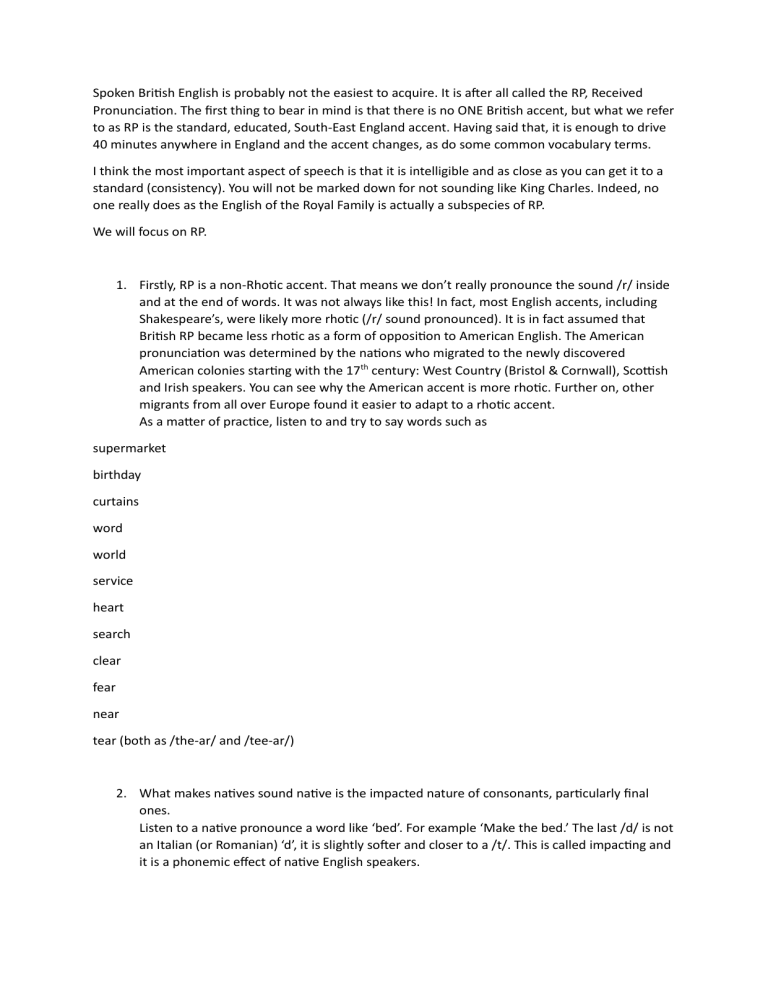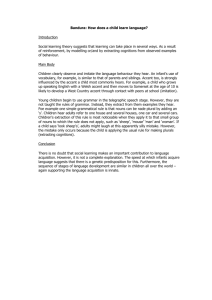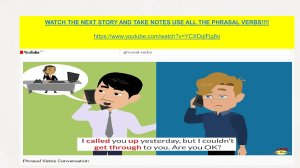
Spoken British English is probably not the easiest to acquire. It is after all called the RP, Received Pronunciation. The first thing to bear in mind is that there is no ONE British accent, but what we refer to as RP is the standard, educated, South-East England accent. Having said that, it is enough to drive 40 minutes anywhere in England and the accent changes, as do some common vocabulary terms. I think the most important aspect of speech is that it is intelligible and as close as you can get it to a standard (consistency). You will not be marked down for not sounding like King Charles. Indeed, no one really does as the English of the Royal Family is actually a subspecies of RP. We will focus on RP. 1. Firstly, RP is a non-Rhotic accent. That means we don’t really pronounce the sound /r/ inside and at the end of words. It was not always like this! In fact, most English accents, including Shakespeare’s, were likely more rhotic (/r/ sound pronounced). It is in fact assumed that British RP became less rhotic as a form of opposition to American English. The American pronunciation was determined by the nations who migrated to the newly discovered American colonies starting with the 17th century: West Country (Bristol & Cornwall), Scottish and Irish speakers. You can see why the American accent is more rhotic. Further on, other migrants from all over Europe found it easier to adapt to a rhotic accent. As a matter of practice, listen to and try to say words such as supermarket birthday curtains word world service heart search clear fear near tear (both as /the-ar/ and /tee-ar/) 2. What makes natives sound native is the impacted nature of consonants, particularly final ones. Listen to a native pronounce a word like ‘bed’. For example ‘Make the bed.’ The last /d/ is not an Italian (or Romanian) ‘d’, it is slightly softer and closer to a /t/. This is called impacting and it is a phonemic effect of native English speakers. Neo-Latin languages, Italian being the primary example, are very clear in their pronunciation of consonants because Latin used to be this way. You will have, through practice, to learn how to impact these consonants. One word of advice. I have noticed that native Italian speakers tend to impact the /t/ in /to/ too much to the point where it becomes a /choo/. You need to find that fine balance between the /t/ and /ch/ that creates native-sounding impacting. 3. Phonemic effects. In most if not all languages, when we speak, we change some of the sounds in words because it is easier for our phonatory apparatus (mouth, tongue, throat). For example, listen to native speakers say ‘Can you do X…’. The /a/ vowel will be very short, almost as if it isn’t there, something like /c’n/. However, if they were to say the word /can/ on its own, or at the end of a sentence, it would still have the full vowel and sound like /can/. This is called elision. There is also something called intromission, where a sound appear somewhere it is not normally found, like in ‘drawing’. Most native speakers will pronounce it /drawRing/. Listen out for it. If you try to pronounce it cleanly, you actually sound less native. 4. This is something that is harder to exemplify in writing, but look out for the rhythm of spoken English as spoken by natives. Because we live in Cardiff we tend to listen to the more musical South Welsh accent most of the time, but pay attention to RP on TV, etc. Try to identify where a sentence is going up or down in sound. Try to look for stress as well (accent as we call it in our languages). Which one of the words is stressed? This changes the rhythm and the meaning. Try saying, on your own, out loud… Can I help you? Can I help you? Can I help you? Can I help you? Think of which one sounds more aggressive, kinder, softer, which one is focused on the person you help or your ability to help them. Intonation and stress in English determine meaning. 5. I should have probably started with this. Try to familiarise yourself with IPA (not India Pale Ale, but the International Phonemic Alphabet). Each symbol stands for a sound. Make sure you always refer to the British IPA as the Americans have their own version. An extremely useful resource is this video. I strongly recommend you watch it whole, but if you don’t have time, focus on the first 23 minutes. It explains why the sounds are where they are. The teacher is quite gifted and an author of many English language teaching books. https://www.youtube.com/watch?v=1kAPHyHd7Lo Sorry if it takes you to minute 19. You can play it from the start. Other considerations: 1. Grammar – This is a paradoxical topic. Although there is no unitary view on grammar and no de jure authority on the English language, and grammar is not properly taught in schools, English grammar has a few traps and areas of difficulty that can make you stand out as a nonnative speaker to natives. This is because natives pick the rules up as they go despite most of them not being able to explain them. You should focus on: A. Correct use of tenses. For example when we can and cannot replace past perfect with past simple. B. Reported / Indirect speech (“I ate a cake.”/ “He said he had eaten a cake.”) C. Indirect Questions (Who are you?/ Would it be possible to tell me who you are?) D. Punctuation. Grammatical signs are not necessarily speech signs, so commas should be used where grammar requires them, not where there’s a pause in the sentence. Beware that English prefers shorter sentences and while a sentence like “I asked him where he was going, this was important to me” might be correctly punctuated using a comma in Italian, in English it would require a full stop between the two clauses. (“I asked him where he was going. This was important to me.”) 2. Idiomatic language. Being able to understand and use idioms, expressions and proverbs is the mark of a proficient speaker. Have a look through this list and try to practice using some of the idioms and phrases. https://www.ef.co.uk/english-resources/english-idioms/ 3. Vocabulary. The wider, the better. English is the language with most words. It numbers around one million, although we only use a few tens of thousands on a regular basis. The vastness of English is due to the history and geographical spread of the British Empire, and also to its genesis out of Saxon (a Germanic language) and Norman (a neo-Latin language based on Vulgar Latin). Often the same concept has two words, one of Saxon and one of Latin origin (law and order, neat and tidy). In other cases, some of the synonyms have mutated as a meaning. To commiserate means to express sympathy, but to complain (which used to mean the same thing, cry together) now means something else. In order to best explore words and words in focus, try to watch and read high quality content. This will help with your listening, reading and writing. Listen to MPs in parliament. They have their own verbal etiquette and are a good example of transactional language in use. https://www.parliamentlive.tv/Commons Read the Guardian and the BBC News website. Focus on opinion articles. They will hope both with your vocabulary and your persuasive writing skills. Research words as you go along. This dictionary has not just definitions, but also a thesaurus (synonyms and antonyms) and a list of examples of how the target word or phrase has been used in literature or the media over time – https://www.thefreedictionary.com/ Here are some lists of words to know: https://www.vocabulary.com/lists/176046 https://www.vocabulary.com/lists/151206 4. One particular area of vocabulary to look at is phrasal verbs. Phrasal verbs are quite unique to English, although Hungarian I believe has something similar. They are made of a verb and at least one other component, usually a preposition. Some are intuitive (look for = search), others less so (farm out = subcontract). Another issue with phrasal verbs is that the same one can mean different things depending on context (‘dress up’ can mean either putting your clothes on OR putting on your best, formal clothes). Sometimes one word can make a big difference (‘look up’ means to search/research, but ‘look up to’ means to take someone as your role model) Here’s a list of common phrasal verbs with examples: https://www.englishclub.com/vocabulary/phrasal-verbs-list.php






